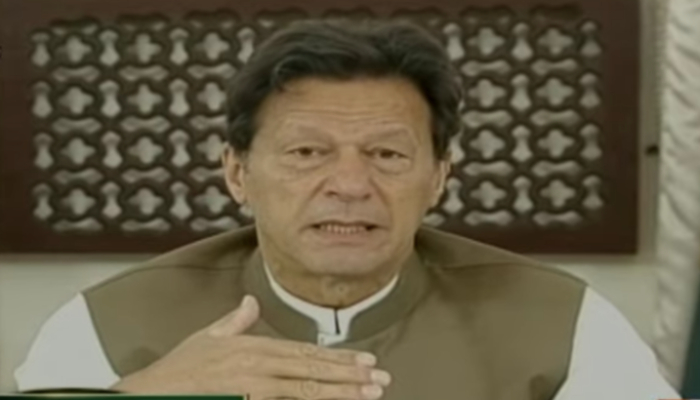PM rules out normalisation of ties with India till Aug 5 move is reversed
Before taking the calls, the premier urged people to "help yourselves and help the nation" by observing coronavirus SOPs
Prime Minister Imran Khan on Sunday (today) said ties with India will not be normalised until New Delhi's August 5 move is revoked.
He said this while answering public queries of people via telephone calls like he had done a few months ago.
The prime minister rejected advice from his aides and ministers, who suggested he answer questions from people in a recorded telecast, the sources confirmed.
The prime minister, instead, insisted on answering the questions during a live transmission.
Before answering the calls, the premier urged people to "help yourselves and help the nation" by observing coronavirus SOPs.
"I will advise everyone to wear this mask," he reiterated.
Govt's responsibility to protect people against virus
PM Imran Khan said it was the government's responsibility to protect people during the infection. He cautioned people to wear masks in closed rooms where there was no ventilation and in buses and other means of transport.
In response to the first caller, the prime minister said Pakistan was importing gas from other countries at exorbitant rates while the resources it was tapping in its own country, were on the decline.
He said countries progress due to higher education among the masses. "We also have to think about what sort of high education we have [to impart]," he said. "Buildings do not bring about quality education; it also depends on what type of degrees they are handing out to students," he said.
PM Imran said the government is bringing about "huge changes" in the HEC, adding that the previous chairman of the education committee was not selected by the incumbent government.
Inflation and mafia
In response to the second caller who complained about inflation, PM Imran Khan said prices of vegetables and other food items were on the rise as the farmers who supplied them wanted their products to be sold at high prices in the market.
"The middlemen are making a lot of money from this," he said.
The prime minister said his government was working towards an ingenious solution through which they are aiming to connect the primary producers of these items to the final consumers.
He said the masses will see the positive effects of the rupee strengthening against the US dollar, adding that the local currency's performance had already led to a decline in prices of diesel.
PTI's democratic change
PM Imran Khan, while answering another caller, maintained that in Pakistan, his party had brought about a "democratic change" unlike the revolutions in France and Iran.
He said the PTI had defeated a two-party system in Pakistan and helped new people take up ministries.
The premier said previously, the two parties who were at each other's throats, were now demanding he step down and were on one page.
"This is the change," he said, adding that now, a government was in place which did not tolerate corruption and was not willing to let the menace go unchecked.
'I cannot fight corruption alone'
Terming corruption a "cancer", the prime minister said that it ends up feasting on a country's progress like termites feast on wood.
He said when prime ministers became corrupt and stole billions from the masses, it resulted in money going out from Pakistan into other countries.
He said Pakistan was fighting a war against corruption, adding that a handful of people in the country were being brought to book for their crimes in Pakistan.
"The entire nation will have to fight this war. Imran Khan alone cannot win it," he lamented.
PM Imran Khan cited a UN report, saying that a mammoth total of $1,000bn was sent to developed countries from poor states each year through corruption and money laundering.
"I am one of the few heads of state in the world who is calling upon the developed countries to return our money back to us," he said, adding that the rich countries were reluctant to do so as they were reaping the benefits of it.
-
Security forces gun down 30 terrorists in multiple IBOs in KP: ISPR
-
MQM-P calls for new province in Sindh
-
US report validates Pakistan military edge over India: PM
-
Banned TTP poses serious threat to Pakistan security: UNSC panel
-
CM Afridi clarifies remarks on by-poll after ECP requests army deployment
-
Dubai sees 3.2m Pakistani passengers in 2025 as airport sets new milestone
-
Security forces kill 23 Indian proxy terrorists in KP's Kurram
-
Pakistan to construct island to boost oil exploration: report












